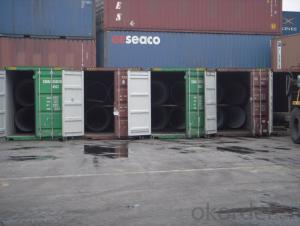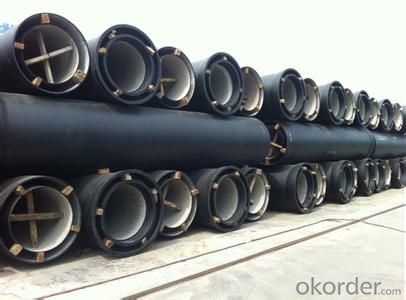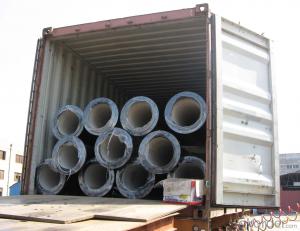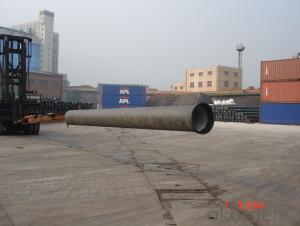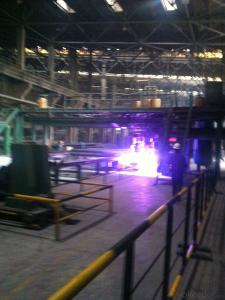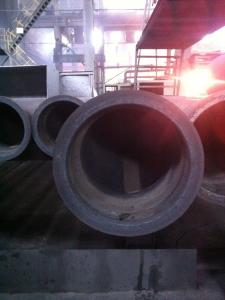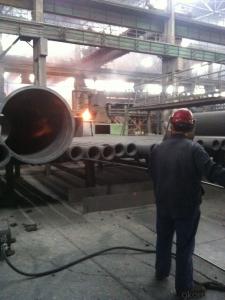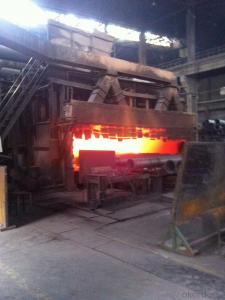DUCTILE IRON PIPE AND PIPE FITTINGS K8CLASS DN1600
- Loading Port:
- Tianjin
- Payment Terms:
- TT OR LC
- Min Order Qty:
- 23 pc
- Supply Capability:
- 3000 pc/month
OKorder Service Pledge
OKorder Financial Service
You Might Also Like
· Material : Ductile Cast Iron
· Size Range : DN 80mm to DN 2000mm
· Unit Effective Length : 6m or 5.7m
· Manufacture Standard: ISO 2531:1998/ EN 545:2006/EN 598:2007
· Annual capacity : 200,000 tons
· Coating Exterior: Zinc 130g/m2 according to ISO 8179-1 and bitumen coating 70 microns.
· Cement Interior: Portland Cement/ High Alumina Cement/ Sulphate Resisting Cement Lining according to ISO 4179
· Special requirements on external coating and internal lining can be applied
· We also provide accessories such as SBR/EPDM rubber gaskets, lubricant paste, pipe caps, PE sleeves, etc.
Additional Parts:
Each pipe is strictly inspected according to related standard to ensure permanently high performance.
Easy Installation at site and service free for life
Long Service Lifespan
Quotation will arrive you within 24hours once we get your inquiry.
We guarantee offering you a competitive price.
A copy of original inspection reports of pipes will be offered after shipment.
Photos of loading process will be sent to the customer after shipment effect.
We will follow-up the delivery progress after shipment effect and update to the customer on weekly basis.
- Q: How do ductile iron pipes perform in sandy soil conditions?
- Ductile iron pipes perform well in sandy soil conditions due to their inherent strength and durability. The material's high tensile strength allows it to withstand the pressure exerted by the surrounding soil, preventing pipe deformation and breakage. Additionally, the corrosion resistance of ductile iron ensures a longer lifespan, even in corrosive sandy soil environments.
- Q: Ductile iron pipe in the direction of it?
- The utility model is mainly used for conveying water, and is an ideal choice for tap water pipes.
- Q: How are ductile iron pipes protected against external corrosion?
- Ductile iron pipes are protected against external corrosion through a combination of manufacturing processes and external coatings. The first line of defense is the inherent corrosion resistance of ductile iron itself. The iron is treated with a special alloying element, typically magnesium, which forms a protective layer on the surface of the pipe. This layer acts as a barrier against corrosion and helps to extend the lifespan of the pipe. In addition to the corrosion-resistant properties of the iron, ductile iron pipes are also externally coated with protective materials. One common method is to apply a layer of asphaltic or bituminous coating to the pipe's surface. This coating acts as a barrier against moisture and corrosive substances in the soil, preventing them from coming into contact with the iron. It also provides a layer of insulation, reducing the likelihood of galvanic corrosion. Another method of external corrosion protection is the use of fusion-bonded epoxy (FBE) coatings. FBE is a thermosetting resin that is applied to the surface of the pipe and then heat-cured to form a strong and durable coating. This coating provides excellent resistance against corrosion, abrasion, and impact, making it a popular choice for ductile iron pipes in harsh environments. In some cases, additional protective measures such as cathodic protection systems may be employed. These systems use electric currents to counteract the corrosion process by supplying electrons to the pipe's surface. This helps to prevent corrosion from occurring, especially in areas where the coating may have been damaged or compromised. Regular maintenance and inspection are also crucial in ensuring the long-term protection of ductile iron pipes against external corrosion. This includes periodic cleaning, repair of any coating damages, and monitoring the integrity of the protective layers. Overall, the combination of the inherent corrosion resistance of ductile iron, external coatings, and maintenance practices ensures that ductile iron pipes are well-protected against external corrosion, allowing them to have a longer lifespan and deliver reliable performance in various applications.
- Q: Can ductile iron pipes be used for underground oil and gas pipelines?
- Yes, ductile iron pipes can be used for underground oil and gas pipelines. Ductile iron is a strong and durable material that can withstand the high pressure and corrosive nature of oil and gas transportation. It has excellent tensile strength and impact resistance, making it suitable for underground applications. Ductile iron pipes are also resistant to external loads, which is important for underground pipelines that may be subject to soil movement or heavy traffic. Furthermore, ductile iron pipes can be easily jointed, allowing for efficient installation and maintenance. However, it is important to consider factors such as soil conditions, environmental factors, and specific project requirements before choosing ductile iron pipes for underground oil and gas pipelines.
- Q: How do ductile iron pipes perform in high-altitude areas?
- Due to their inherent strength and durability, ductile iron pipes are highly effective in high-altitude regions. The exceptional properties of ductile iron, such as its high tensile strength and impact resistance, make it ideal for withstanding the challenges presented by high-altitude environments. One significant advantage of ductile iron pipes is their ability to endure both internal and external pressures. In areas with varying water pressure, these pipes can withstand such fluctuations without compromising their structural integrity. This guarantees a consistent and uninterrupted flow of water, eliminating the risk of pipe failures or leaks. Furthermore, ductile iron pipes possess excellent resistance against corrosion, which is crucial in high-altitude areas with unpredictable and harsh atmospheric conditions. The protective lining and external coatings of these pipes provide an additional layer of defense, ensuring their durability and reducing the need for frequent maintenance or replacements. Additionally, ductile iron pipes have a higher tolerance for temperature variations compared to other materials. In high-altitude regions where temperature fluctuations can be extreme, these pipes can withstand expansion and contraction without cracking or rupturing. This thermal stability is vital for maintaining the integrity of the pipeline system and preventing costly repairs. To summarize, ductile iron pipes are an ideal choice for high-altitude areas due to their strength, durability, resistance to pressure variations, corrosion resistance, and thermal stability. These properties make them a reliable option for water distribution systems in such environments, ensuring a continuous water supply without compromising safety or efficiency.
- Q: Deep well spiral iron pipe, or ductile iron tube?
- Ductile weakness: ductile cast iron pipes connected by human factors such as the operation level of responsibility, influence, construction not convenient. The advantages of PE PE PE pipe has good corrosion resistance and its anti inorganic performance than that of the metal pipe is much stronger in the buried without corrosion, construction convenient. Small diameter PE pipe in the price performance ratio is better than that of steel and ductile iron.PE tube have disadvantages: benzene, gasoline, carbon tetrachloride and other organic solvents have certain effect on pe. If the organic solvent is infiltrated into the polyethylene, the swelling will occur, and its physical properties will be decreased. Its pressure resistance and temperature resistance are poor.
- Q: How are ductile iron pipes joined to fittings and valves?
- Ductile iron pipes are typically joined to fittings and valves through a process known as flanged connection or mechanical joint. Flanged connections involve the use of flanges, which are circular discs with evenly spaced holes around the perimeter. These flanges are bolted together, creating a tight seal between the pipe and the fitting or valve. To join a ductile iron pipe to a fitting or valve using a flanged connection, the pipe end is first prepared by cleaning and deburring any rough edges. A gasket made of rubber or other suitable material is then placed between the pipe end and the flange face. The flange is aligned with the pipe, and bolts are inserted through the holes in the flange, passing through corresponding holes in the fitting or valve. Once all the bolts are in place, they are tightened evenly, gradually applying pressure to compress the gasket and create a secure and leak-proof seal. To ensure proper alignment and sealing, tightening the bolts is typically done in a specific pattern or sequence. Alternatively, ductile iron pipes can also be joined to fittings and valves using mechanical joints. This involves the use of a rubber gasket or gland that is inserted into a groove on the pipe end. The fitting or valve also has a corresponding groove, and when the two are brought together, the gasket is compressed, creating a tight seal. Mechanical joints offer some flexibility, allowing for slight movement or expansion and contraction of the pipe. This can be beneficial in applications where there may be thermal variations or ground movement, reducing the risk of pipe failure. Both flanged connections and mechanical joints are widely used in various industries and applications that require the joining of ductile iron pipes to fittings and valves. The choice of joining method depends on factors such as the specific application, pipe size, pressure requirements, and local codes and regulations.
- Q: How can the connection of ductile iron pipe elbow be convenient for connecting?
- The groove connecting pipe consists of two categories of products: sealing function of pipe connections with rigid joint, flexible joint, mechanical three and groove flange; the pipe connections transition of elbow, three links, four links, different diameter pipe, blind plate etc..
- Q: Are ductile iron pipes suitable for underground parking structures?
- Yes, ductile iron pipes are suitable for underground parking structures. Ductile iron pipes are known for their strength and durability, making them an ideal choice for underground applications where they may be subjected to heavy loads or potential impacts. Additionally, ductile iron pipes have excellent corrosion resistance, which is crucial in underground environments where they may be exposed to moisture and other corrosive elements. The high tensile strength and flexibility of ductile iron pipes also allow them to withstand ground movements and settle without cracking or breaking, further enhancing their suitability for underground parking structures. Overall, ductile iron pipes provide a reliable and long-lasting solution for the drainage and water supply needs of underground parking facilities.
- Q: How do ductile iron pipes handle differential settlement?
- Ductile iron pipes possess exceptional durability and are renowned for their ability to endure diverse environmental conditions, including differential settlement. Differential settlement refers to the uneven settling of the ground, which can often impose stress and strain on underground pipes. Specifically engineered to address settlement issues, ductile iron pipes exhibit inherent flexibility and strength. These pipes possess the capacity to flex and accommodate slight ground movements without incurring significant damage or failure. The flexibility of ductile iron pipes enables them to evenly distribute the stress and strain caused by differential settlement along their length. This characteristic assists in averting concentrated stress points that could potentially result in cracks or fractures in the pipe. Furthermore, the inherent strength of ductile iron pipes equips them with the necessary resistance to withstand the forces generated by differential settlement. The pipes' robust construction and high tensile strength render them less susceptible to deformation or damage caused by ground movements. Moreover, ductile iron pipes are commonly installed with flexible joints, such as rubber gaskets or push-on joints. These joints permit some movement and adapt to any slight misalignment or settlement that may occur. By providing flexibility at the joints, the pipes can better adjust to changes in ground conditions and diminish the risk of failure. In conclusion, ductile iron pipes possess the necessary attributes to effectively cope with differential settlement due to their flexibility, strength, and utilization of flexible joints. These features guarantee that the pipes can endure ground movements and continue to function efficiently without compromising their integrity or longevity.
Send your message to us
DUCTILE IRON PIPE AND PIPE FITTINGS K8CLASS DN1600
- Loading Port:
- Tianjin
- Payment Terms:
- TT OR LC
- Min Order Qty:
- 23 pc
- Supply Capability:
- 3000 pc/month
OKorder Service Pledge
OKorder Financial Service
Similar products
Hot products
Hot Searches
Related keywords

